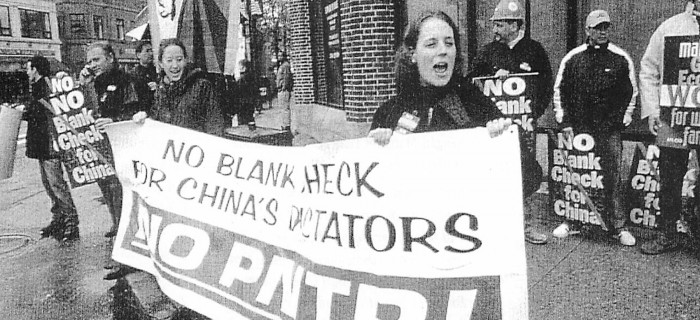Dangerous Liaisons: Progressives, the Right and the Anti-China Trade Campaign
Food First Backgrounder, Spring 2000, Vol. 6, No. 1
The recent debate in the U.S. over granting Permanent Normal Trading Relations (PNTR) status to China has divided anti-corporate globalization activists in North America from their counterparts in Southern countries. We feel it is useful to reflect on why activists in the South feel alienated by what they see as “single-country bashing” in the North. In the U.S. a coalition of forces sought to deprive China of PNTR as a means of blocking that country’s entry into the World Trade Organization (WTO). Let us state at the beginning that we do not approve of the free trade paradigm that underpins PNTR status, and most certainly do not support the WTO. In fact, we believe it would be a mistake for China to join the WTO. But the issue we wish to reflect on in this Backgrounder is not the desirability or undesirability of free trade and the WTO, but rather one country, the US, taking upon itself to unilaterally decide who is and who is not a legitimate member of the international community.
The China campaign has brought many progressive American groups into an unholy alliance with the Right. It splits the post-Seattle transnational progressive movement that was in the process of forming the most solid alliances in decades. When they hear phrases like “rogue nation” and “Yellow Peril”—which were used in the anti-China campaign—Southern activists are left wondering when their homeland might be the next to be bashed in a racially tinged outburst from the North.
The Real China
China is one of the world’s most dynamic economies, growing between seven to ten per cent a year over the past decade. Its ability to leap from abject poverty to decent living conditions in five decades is no mean achievement. That economic dynamism cannot be separated from its social revolution in the late forties and early fifties, which eliminated the worst inequalities in the distribution of land and income and prepared the country for economic takeoff when reforms were introduced in the agricultural sector in the late 1970s. The liberation movement decisively wrested control of the national economy from foreign interests. Today China is a strong state, born in revolution, and steeled in several decades of wars both hot and cold.
Foreign investors can force other governments to accommodate them. That is something they find difficult to do in China, who is prepared to impose restrictions on foreign capital so that it contributes more to development, from creating jobs to actually transferring technology. These are things that Southern activists admire.


 Help Food First to continue growing an informed, transformative, and flourishing food movement.
Help Food First to continue growing an informed, transformative, and flourishing food movement.




